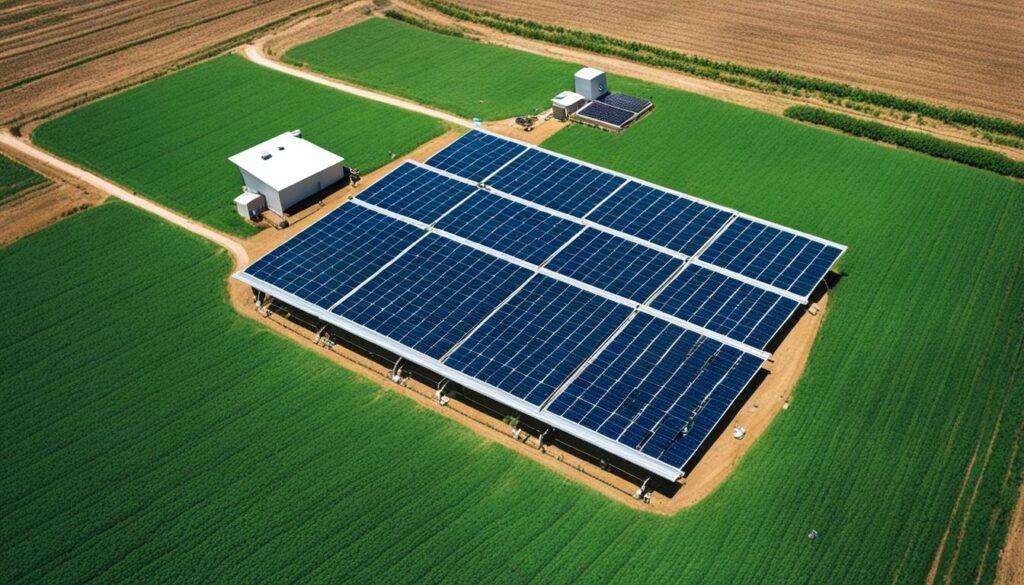Solar water pump solutions offer an eco-friendly way to address water scarcity and energy challenges in rural areas. With the advancements in solar technology and their affordability, the use of solar water pump is expected to continue growing. These Solar Water pump provide several benefits, including the ability to provide water in remote areas without electricity, environmental friendliness with zero harmful emissions, independence from traditional energy sources, reliable performance for up to 25 years.
These solar-powered water pumps are particularly beneficial for agricultural purposes. As these pumps can efficiently provide water for irrigation without relying on the grid. The sustainable water pump solutions enable off-grid water pump, giving farmers independence and flexibility in their operations. Moreover, the use of solar water pump systems contributes to reducing greenhouse gas emissions and minimizing the impact on the environment.
Key Takeaways
- Solar water pump solutions offer a cost-effective for addressing water scarcity and energy challenges in rural areas.
- These renewable energy water pump provide water in remote areas without electricity, utilizing renewable solar energy and minimizing the dependence.
- These systems have low maintenance requirements and can operate reliably for up to 25 years.
- In agriculture, solar water pumps contribute to sustainable farming practices and enable off-grid water pumping, enhancing agricultural productivity and reducing environmental impact.
- By investing in these water pump solutions, farmers can achieve energy independence, cost savings, and contribute to a more sustainable future.
Types of Solar Water Pump
When it comes to solar water pump solutions, there are two main types that are commonly used:
Surface pumps :
These pumps are installed above ground and are well-suited for moving large quantities of energy-efficient water pump at a slow pace. These water pumps are commonly used in agricultural and irrigation systems, where they can efficiently distribute water across expansive fields. Surface pumps are designed to be durable and capable of handling the demands of continuous operation.
Submersible pumps:
On the other hand, are installed underground with the solar panels connected above ground. These pumps are typically used to extract water from wells or ponds and bring it to the surface for various purposes. Submersible solar water pumps offer the advantage of being more discreet, as they are hidden underground and do not disrupt the visual landscape.
A solar pumping system consists of several components, including solar panels, a controller, and the pump itself. Solar panels capture sunlight and convert it into electricity, which is used to power the pump. The controller regulates the power flow and ensures the system operates efficiently. The pump is responsible for moving the water and has various impeller designs to suit different applications.
The solar drive is an integral part of the system, as it converts the direct current (DC) voltage input from the solar panels into a three-phase alternating current (AC) output. This conversion is necessary to control the speed of the motor and adjust the pump’s impeller speed. The size of the photovoltaic (PV) system’s directly dependent on factors such as the size of the pump, the water requirement, and the available solar irradiance.
Now, let’s take a look at a comparison table of the main features and advantages of surface pumps and submersible pumps:
| Surface Pumps | Submersible Pumps | |
|---|---|---|
| Installation | Above ground | Underground |
| Application | Large-scale irrigation | Well and pond extraction |
| Visibility | Visible above ground | Hidden underground |
| Operation | Slow pace, large water quantities | Efficient water extraction |
| Energy Source | Solar panels | Solar panels |
As you can see, both surface pumps and submersible pumps have their unique advantages and suitable for different applications.
Economic Advantage of Solar Water Pump
These solutions offers compelling economic benefits beyond their initial installation costs. These systems minimize operational expenses, reduce dependence on traditional power sources, and contribute to long-term financial savings.
The return on investment (ROI) for solar pumping is favorable due to reduced energy bills, minimal maintenance costs, and potential government incentives. By harnessing the power of the sun, solar water pumps provide immense cost efficiency, allowing users to save significantly on their energy expenses.
Moreover, solar water pump solutions offer off-grid energy independence, ensuring a reliable water supply even in areas without access to electricity grids. This independence shields users from volatile energy prices, providing stability and financial security.
In the agricultural sector, solar water pumps play a crucial role in driving agricultural prosperity. By facilitating efficient irrigation, these pumps lead to increased crop yields and higher income for farmers. Solar water pump solutions provide a sustainable and reliable water source, enabling farmers to maximize their agricultural production of their communities.
Furthermore, the adoption of solar water pump solutions leads to job creation, especially in areas where agriculture is a primary economic activity. With the implementation of solar-powered irrigation systems, there is a growing demand for skilled technicians, engineers, and maintenance personnel, creating employment opportunities and boosting local economies.
In addition to the economic advantages, solar water pump solutions also contribute to water scarcity mitigation. By harnessing renewable solar energy, these pumps provide a sustainable and environmental friendly solution to address water scarcity.

Conclusion
Solar water pump solutions hold the key to a sustainable future, offering a range of advantages that pave the way for economic prosperity. By harnessing the power of cutting-edge technologies, these pumps provide a comprehensive solution to address the pressing water of today.
With their cost efficiency, solar water pumps help individuals and communities achieve energy independence while minimizing operational expenses. Moreover, the adoption of solar water pumps leads to increased agricultural productivity, ensuring a steady and reliable water supply for irrigation. This not only enhances crop yields but also contributes to job creation in areas where agriculture is a primary economic activity.
By embracing solar water pump solutions, we can mitigate water scarcity, secure the future of our communities.
FAQ
What are the benefits of using a solar water pump?
Solar water pumps offer numerous benefits, including providing water in remote areas without access to electricity, utilizing renewable energy, emitting zero harmful emissions, requiring minimal maintenance, and providing reliable performance for up to 25 years.
What are the types of solar pumps available?
There are two main types of solar pumps: surface pumps and submersible pumps. Surface pumps are installed above ground and are suitable for moving large quantities of water at a slow pace. Submersible pumps, on the other hand, are installed underground and are used to move water from wells or ponds to the surface.
What components make up a solar pumping system?
A solar pumping system consists of solar panels, a controller, and the pump itself. The solar panels convert sunlight into electricity, which is then controlled by the controller to power the pump and move water.
What economic advantages do solar water pump solutions offer?
Solar water pump solutions offer compelling economic benefits, including reduced operational expenses, decreased dependence on traditional power sources, long-term financial savings, lower energy bills, minimal maintenance costs, and potential government incentives. These solutions also provide off-grid energy independence, contributing to a reliable water supply and protection against volatile energy prices.
How do solar water pumps benefit agriculture?
Solar water pumps play a vital role in agriculture by increasing crop yields and income through efficient irrigation. These pumps help farmers achieve better water management, leading to improved productivity and sustainability in the agricultural sector.
Do solar water pumps contribute to job creation?
Yes, the adoption of solar water pump solutions contributes to job creation, especially in areas where agriculture is a primary economic activity. The installation, maintenance, and manufacturing of solar water pump systems create employment opportunities, boosting local economies.
How do solar water pumps help mitigate water scarcity?
Solar water pump solutions help mitigate water scarcity by ensuring a consistent and reliable water supply for communities, even in remote areas without access to electricity. By utilizing renewable solar energy, these pumps provide a sustainable and environmentally friendly solution to water scarcity challenges.
What role does Morca Pumps play in solar water pump solutions?
Morca Pumps offers a range of diverse and tailored solar-powered solutions to meet specific needs. By embracing cutting-edge technologies, Morca Pumps empowers individuals and communities to invest in a more sustainable future, combining economic prosperity with environmental responsibility

